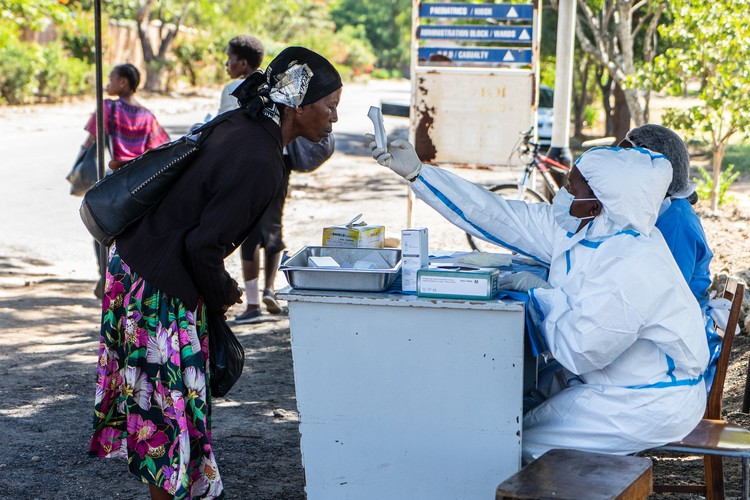How bad is health care in Zimbabwe?
It’s not great but not as bad as MEC Phophi Ramathuba has suggested
A woman gets her temperature checked before entering Mpilo Hospital, Bulawayo, 25 April 2020. Photo: KB Mpofu / ILO via Flickr (CC BY-NC-ND 2.0)
In light of the video of Dr Phophi Ramathuba, Limpopo MEC for Health, berating a Zimbabwean patient for the failure of the Zimbabwean government to provide health services, it’s worth asking the question: Just how bad is the Zimbabwean health service?
Dr Francois Venter of Ezintsha at Wits University sent private emails to his contacts in Zimbabwe to find out.
Here are some of the responses he got (lightly edited for typos and grammar):
“Access to antiretroviral treatment [for people with HIV] is not a problem in Zimbabwe. At times there are issues regarding laboratories, but these are usually temporary.”
“Routine antenatal care is available in all districts across the country. Complicated cases requiring assisted delivery are referred to district hospitals. We do not have a significant access issue for most of the population.”
“If someone was in a car accident and had moderate injuries requiring a general anaesthetic and, say, a fracture alignment, would they usually get it? Yes, however they may face delays … Access to emergency care for severe injuries such as head injuries requiring urgent CT scans is limited outside major cities.”
“If a child needed hospitalisation for pneumonia, and needed antibiotics and oxygen, would they usually get it? Yes, this is available in hospitals across the country.”
Venter said he asked his contacts not to sugarcoat their responses and to stick to the current situation. “Part of the reason I wanted to hear from them, was that I got referrals from Zimbabwean public services all the time and have had no indications of any problems in the antiretroviral programme. I also visited clinics in Zimbabwe in 2018. They were very busy and hard, overworked health workers, but I did not see collapsing health services, or at least nothing you wouldn’t see in Johannesburg where I work.”
Venter makes a tentative conclusion: “Zimbabwe is politically autocratic, but that doesn’t mean its health services are collapsing. They are challenged, but probably stronger overall than, say, much of the Eastern Cape.”
Support independent journalism
Donate using Payfast

Don't miss out on the latest news
We respect your privacy, and promise we won't spam you.
Next: TAC tackles health minister on medical xenophobia
Previous: Medicine stockouts: contraceptives are the worst hit
© 2022 GroundUp. This article is licensed under a Creative Commons Attribution-NoDerivatives 4.0 International License.
You may republish this article, so long as you credit the authors and GroundUp, and do not change the text. Please include a link back to the original article.
We put an invisible pixel in the article so that we can count traffic to republishers. All analytics tools are solely on our servers. We do not give our logs to any third party. Logs are deleted after two weeks. We do not use any IP address identifying information except to count regional traffic. We are solely interested in counting hits, not tracking users. If you republish, please do not delete the invisible pixel.

